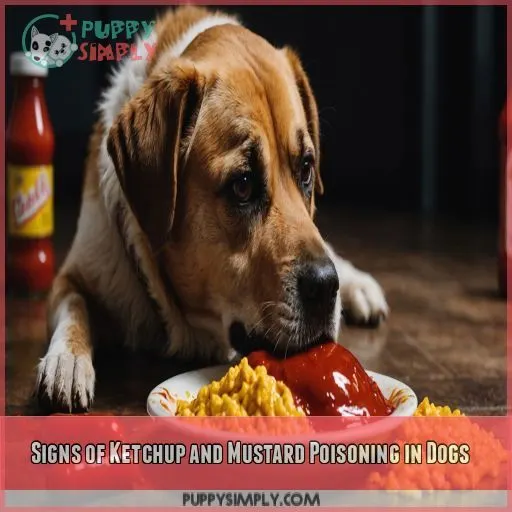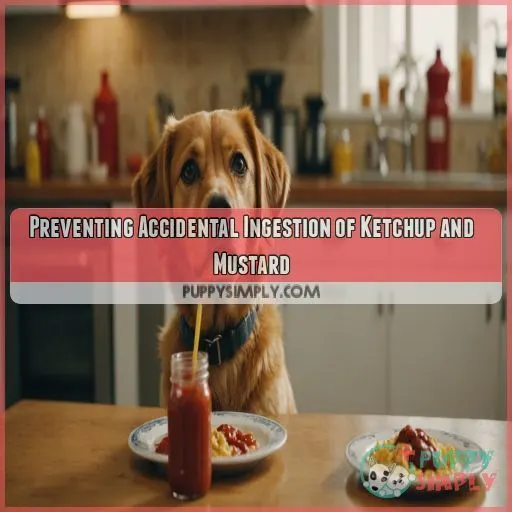This site is supported by our readers. We may earn a commission, at no cost to you, if you purchase through links.

Both condiments contain toxic compounds that can cause a world of trouble for your furry friend.
Mustard’s got isothiocyanates and goitrogens, which can irritate their digestive tract and disrupt thyroid function.
Ketchup’s high sugar and salt content can lead to obesity, dehydration, and other health issues.
And if your pup ingests either, symptoms like vomiting, diarrhea, and lethargy can follow.
So, what’s a pet parent to do?
Stay tuned for some pup-safe alternatives that’ll satisfy your dog’s cravings without putting them in harm’s way!
Table Of Contents
- Key Takeaways
- Can Dogs Eat Mustard and Ketchup?
- Why is Mustard Bad for Dogs?
- Is Ketchup Safe for Dogs?
- Signs of Ketchup and Mustard Poisoning in Dogs
- Safe Condiments and Toppings for Dogs
- Preventing Accidental Ingestion of Ketchup and Mustard
- Frequently Asked Questions (FAQs)
- What if a dog eats mustard?
- Is ketchup and mustard ok for dogs?
- Is it safe for dogs to eat ketchup?
- Can dogs have mayonnaise or mustard?
- What are the long-term effects of mustard on dogs health?
- Can dogs develop an allergy to ketchup or mustard?
- How do I treat my dogs mustard-induced vomiting at home?
- Are some breeds more susceptible to ketchup and mustard toxicity?
- Can ketchup and mustard cause stomach ulcers in dogs?
- Conclusion
Key Takeaways
- You’ll want to steer clear of sharing mustard and ketchup with your furry friend – both condiments contain toxic compounds that can cause vomiting, diarrhea, and even life-threatening reactions. So, it’s best to keep them off the menu altogether!
- If your pup accidentally ingests mustard or ketchup, monitor them closely for signs of poisoning, including diarrhea, vomiting, bloating, lethargy, dehydration, choking, or even seizures, and seek veterinary help as soon as possible if symptoms persist or worsen.
- Don’t worry, there are yummy alternatives to mustard and ketchup that are safe for your pup! Wholesome homemade gravies, pumpkin puree, unsalted bone broth, and commercial food toppers can add flavor to their meals without the risk of toxicity.
- To prevent accidental ingestion, keep those pesky condiments out of reach, educate family members and caregivers about the dangers of mustard and ketchup for dogs, and monitor your pup’s snacks like a pro – after all, it’s always better to be safe than sorry when it comes to your furry friend’s health!
Can Dogs Eat Mustard and Ketchup?
You’re probably wondering if it’s okay to share your favorite condiments with your furry friend, but the truth is, mustard and ketchup aren’t dog-friendly. In fact, In fact, they contain toxic compounds that can cause some serious health issues in dogs, similar to onion toxicity symptoms, so it’s best to keep them out of reach – and out of your dog’s meals – altogether.
, so it’s best to keep them out of reach – and out of your dog’s meals – altogether.
Toxic Compounds in Mustard and Ketchup
Regarding your furry friend’s snack time, you frequently wonder what’s safe and what’s not. Mustard and ketchup contain toxic compounds that can harm your dog. Here are some culprits to watch out for:
- Isothiocyanates in mustard can irritate your dog’s digestive tract
- Goitrogens in mustard can disrupt healthy thyroid function
- Excess sugar in ketchup can lead to obesity
- Onion and garlic powder in ketchup can cause anemia
Risks of Feeding Mustard and Ketchup to Dogs
Feeding your furry friend mustard and ketchup can be a recipe for disaster. Mustard seeds contain toxic compounds that can cause gastroenteritis in dogs, leading to vomiting, diarrhea, and abdominal pain. Ketchup’s high sugar and salt content, similar to ham’s dangers of high sodium, can also wreak havoc on your dog’s digestive system.
. Be cautious with canine condiments – your pup’s health is at stake!
Safe Alternatives to Mustard and Ketchup for Dogs
Your furry friend’s taste buds are in luck! Ditch the toxic mustard and ketchup for these pup-friendly alternatives:
- Homemade dog gravy made with love
- Pumpkin puree for an extra nutritional boost
- Unsalted bone broth for a tasty treat
- Commercial food toppers with wholesome ingredients
- Tail-wagging sauces made from dog-safe recipes
Why is Mustard Bad for Dogs?
You’re probably wondering why mustard is off-limits for your furry friend – it’s because those tiny seeds contain not-so-tiny toxic compounds called isothiocyanates and goitrogens. If your dog gets a hold of mustard, these toxins can cause some serious discomfort, from vomiting and diarrhea to abdominal pain and even thyroid problems.
Isothiocyanates and Goitrogens in Mustard
Let’s get down to business – why is mustard bad for dogs? Mustard seeds contain glucosinolates, which convert into toxic isothiocyanates and goitrogens. These compounds can disrupt your dog’s thyroid function and irritate their digestive tract. Think of goitrogens like party crashers – they’re unwelcome guests that can wreak havoc on your dog’s health, similar to how high fat foods can trigger pancreatitis in dogs.
.
Symptoms of Mustard Poisoning in Dogs
Now that you know about the toxic compounds in mustard, let’s talk about the symptoms of mustard poisoning in dogs. If your furry friend has ingested mustard, keep an eye out for canine toxicity signs like vomiting, diarrhea, and abdominal pain. Your dog may also show pet poison symptoms like lethargy, bloating, and gas, which can lead to dehydration.
Treatment for Mustard Poisoning in Dogs
If your furry friend has ingested mustard, don’t panic! Treatment for mustard poisoning in dogs typically involves fluid IVs to manage dehydration and antiemetics to stop vomiting. Your vet may also administer activated charcoal to absorb any remaining toxins. In severe cases, hospitalization may be necessary. Always consult with a veterinary expert for personalized advice.
Is Ketchup Safe for Dogs?
As you’re figuring out what human foods are safe for your furry friend, you’re probably wondering if ketchup is okay for dogs – after all, who doesn’t love a good french fry or scrambled egg with a dash of ketchup?
Unfortunately, ketchup isn’t the best choice for dogs due to its high sugar and salt content.
Ketchup also has the potential for onion and garlic powder, and preservatives that can lead to long-term health issues.
Excess Sugar and Salt in Ketchup
Regarding ketchup, you might be surprised to learn that it’s not as harmless as it seems. Here are 3 key concerns:
- Sugar overload: Ketchup is high in added sugars, which can lead to a rapid spike in your dog’s blood sugar levels.
- Excessive salt: Ketchup contains salt, which can be toxic to dogs in large amounts.
- Nutrient imbalance: Regular ketchup consumption can lead to an imbalanced diet for your furry friend.
Risk of Onion and Garlic Powder in Ketchup
You’re aware that ketchup contains onion and garlic powder, but do you know the risks? These powdered ingredients can be toxic to dogs, causing damage to their red blood cells. Onion toxicity and garlic overload can lead to anemia, so it’s vital to keep ketchup out of reach. Your furry friend’s safety depends on condiment safety!
Preservatives and Long-term Health Risks
The sweet and tangy taste of ketchup – who can resist? But, as a responsible dog parent, you need to know the risks. Commercial ketchups often contain artificial preservatives, which have been linked to canine cancer concerns and long-term health consequences. Opt for dog-safe alternatives or homemade ketchups to avoid these toxic ingredient effects and safeguard your furry friend’s safety.
Signs of Ketchup and Mustard Poisoning in Dogs
You’re probably worried sick if your furry friend has accidentally licked up some ketchup or mustard – and rightly so! If your dog has ingested either condiment, look out for telltale signs of poisoning, including diarrhea, vomiting, bloating, lethargy, dehydration, choking, or even seizures.
Diarrhea and Vomiting
If your furry friend has ingested ketchup or mustard, watch out for diarrhea and vomiting – the dynamic duo of digestive distress. These symptoms can lead to dehydration and electrolyte imbalances, putting your pup’s health at risk. Seek veterinary attention ASAP to avoid complications like canine GI upset or even digestive system failure. Your pet’s gut health is worth it!
Bloating and Gas
Frequently, a dog’s digestive system can’t handle the toxic compounds in mustard and ketchup, leading to bloating and gas. If your furry friend is experiencing discomfort, watch out for these signs:
- Swollen belly
- Whining or whimpering
- Restlessness
- Lack of appetite
- Passing gas
If you notice any of these symptoms, it’s time to take action and find some gas relief for your poor pup!
Lethargy and Dehydration
Lethargy and dehydration can be signs that your furry friend is struggling with ketchup or mustard poisoning. Monitor your dog’s water intake and watch for warning signs like excessive thirst, dark urine, or sunken eyes. If you suspect dehydration, consult your vet about IV treatment and electrolyte balance. With prompt care, your dog can recover in no time!
Choking and Seizures
If your dog is experiencing lethargy and dehydration from ketchup or mustard poisoning, things can quickly take a turn for the worse.
Choking and seizures can occur if your dog’s airway becomes blocked or if the toxins cause neurological symptoms.
Keep a close eye on your dog’s behavior and know canine seizure and anxiety symptoms and dog choking hazards to act fast in an emergency
.
Safe Condiments and Toppings for Dogs
You’re probably curious to know what condiments are safe for your furry friend, now that we’ve established that mustard and ketchup are off the menu. Let’s explore some yummy and healthy alternatives, like homemade dog gravy, pumpkin puree, and unsalted bone broth, that’ll make your dog’s tail wag with excitement.
Homemade Dog Gravy and Pumpkin Puree
The quest for a tasty, The quest for a tasty, safe dog treat option.
! Consider whipping up a homemade dog gravy using low-sodium broth and green beans. Alternatively, pumpkin puree is a nutritious, easily digestible option. Rich in fiber, pumpkin supports healthy digestion and can even help with weight management. Get creative with these dog-friendly ingredients and give your furry friend a treat they’ll love!
Unsalted Bone Broth and Commercial Food Toppers
As you spice up your pup’s meals, consider unsalted bone broth – a nutritious and easily digestible option.
Commercial food toppers can also add flavor without the risk of mustard or ketchup.
When introducing new foods, remember to monitor for signs of food allergies and consult with your vet for personalized pet nutrition advice to promote your furry friend’s digestive health.
Healthy Alternatives to Mustard and Ketchup
As you ditch the mustard and ketchup, don’t worry, there are yummy alternatives! Wholesome homemade gravies, made with love and care, can add flavor to your pup’s meals. Nutritious dog toppings like pumpkin puree, green beans, and carrots are also great options. For a special treat, try canine-friendly sauces or healthy pet flavorings – your furry friend will thank you!
Preventing Accidental Ingestion of Ketchup and Mustard
As you navigate the tricky world of condiments and canines, you must take steps to prevent accidental ingestion of ketchup and mustard. By keeping these condiments out of reach, educating family members and caregivers, By keeping these condiments out of reach, educating family members and caregivers, and monitoring your dog’s food and snacks to prevent salt poisoning in dogs, you can notably reduce the risk of a potentially toxic mishap.
, you can notably reduce the risk of a potentially toxic mishap.
Keeping Condiments Out of Reach
Now that you’ve got some yummy, pup-friendly alternatives to mustard and ketchup, let’s talk about keeping those pesky condiments out of reach. You know, to avoid any accidental ingestion drama. Here are some condiment storage ideas to get you started:
- Store them in high cabinets or on top shelves
- Use child-safety locks or latches on cabinets and drawers
- Keep them in a separate, pet-inaccessible pantry or room
Educating Family Members and Caregivers
Now that you’ve got those condiments out of reach, it’s time to get everyone on the same page.
Educate family members and caregivers about the dangers of mustard and ketchup for dogs.
Share dog-safe snack options and emphasize the importance of pet food safety.
A little knowledge can go a long way in preventing accidents and keeping your furry friend safe.
Monitoring Food and Snacks for Dogs
As your furry friend’s guardian, it’s really important to keep a hawk’s eye on their snacks. Human food can be a minefield of toxic treats, so monitor those snacks like a pro! Store condiments safely, and when in doubt, opt for pup-safe alternatives like green beans or carrots. Your dog’s health is worth the extra vigilance.
Frequently Asked Questions (FAQs)
What if a dog eats mustard?
Did you know that a single packet of mustard can be toxic to dogs? If your furry friend eats mustard, monitor them closely for vomiting, diarrhea, and abdominal pain, and seek vet help if symptoms persist or worsen.
Is ketchup and mustard ok for dogs?
Sorry to be the condiment cop, but ketchup and mustard aren’t okay for dogs. Both contain toxic compounds that can cause vomiting, diarrhea, and even life-threatening reactions, so it’s best to keep them off the menu.
Is it safe for dogs to eat ketchup?
Carefully consider ketchup’s canine consequences! As a cautious companion, it’s best to avoid serving ketchup to your furry friend due to its added sugar, salt, and spices, which can spark stomach issues and other adverse reactions.
Can dogs have mayonnaise or mustard?
Sorry, buddy! Mayonnaise and mustard are off the menu for your furry friend. Both contain ingredients that can cause stomach issues, so it’s best to stick to pup-safe alternatives to avoid any adverse reactions.
What are the long-term effects of mustard on dogs health?
Imagine a ticking time bomb in your furry friend’s belly – that’s what mustard can be! Long-term effects on your dog’s health include potentially life-threatening conditions, so keep that condiment out of paw’s reach, pronto!
Can dogs develop an allergy to ketchup or mustard?
You’re wondering if dogs can develop an allergy to ketchup or mustard? While it’s possible, it’s more likely your furry friend will experience gastrointestinal upset due to the toxic compounds in mustard and added sugars in ketchup.
How do I treat my dogs mustard-induced vomiting at home?
Your poor pup’s in a pickle! For mustard-induced vomiting, withhold food for 12-24 hours, offer small sips of water, and consider a bland diet like boiled chicken and rice. If symptoms persist, seek veterinary help ASAP.
Are some breeds more susceptible to ketchup and mustard toxicity?
While no specific breeds are more susceptible to ketchup and mustard toxicity, dogs with pre-existing GI or liver conditions may have more severe reactions . Always monitor your dog’s behavior and consult a vet if you have concerns (Source).
Can ketchup and mustard cause stomach ulcers in dogs?
When your furry friend ingests ketchup and mustard, you might worry about stomach ulcers. While mustard seeds contain toxic compounds that can irritate their digestive tract, there’s no direct link to stomach ulcers .
Conclusion
Figuring out what human food is safe for your furry friend can be a minefield.
Condiments like mustard and ketchup are no exception.
Now you know the toxic truths: both can wreak havoc on your pup’s digestive tract and overall health.
So, the next time you’re tempted to share, remember: can dogs eat mustard and ketchup? Absolutely not!
Instead, stick to pup-safe alternatives and keep those condiments out of reach to keep your companion happy and healthy.











